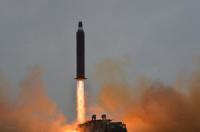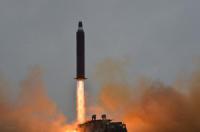-
NK has 13-30 nuclear weapons, and will have up to 60 nukes by 2020
North Korea is estimated to have 33 kilograms of separated plutonium, and between 175 and 645 kilograms of weapon-grade uranium. If NK used 70 percent of the available estimated stocks of plutonium and weapon-grade uranium to make nuclear bombs, then, depending on the yield of each bomb, its nuclear arsenal would now consist of between 13 and 30 nuclear weapons. Based on a cumulative estimate, North Korea is currently expanding its nuclear weapons at a rate of about 3-5 weapons per year. Through 2020, North Korea is projected to have 25-50 nuclear weapons. Depending on the operation of the Experimental Light Water Reactor (ELWR) at Yongbyon, NK could have up to 60 nuclear weapons by the end of 2020.
-
-
Experimental box to track nuclear activity by rogue nations
Researchers are carrying out a research project at Dominion Power’s North Anna Nuclear Generating Station in Virginia that could lead to a new turning point in how the United Nations tracks rogue nations that seek nuclear power. The years-long project centers on a high-tech box full of luminescent plastic cubes stacked atop one another that can be placed just outside a nuclear reactor operated by, say, Iran. The box would detect subatomic particles known as neutrinos produced by the reactor, which can be used to track the amount of plutonium produced in the reactor core.
-
-
North Korean missiles can reach major U.S. cities beyond West Coast
Based on current information, the recent missile test by North Korea could easily reach the U.S. West Coast and a number of major U.S. cities beyond the West Coast. News reports say that North Korea again launched its missile on a very highly lofted trajectory, which allowed the missile to fall in the Sea of Japan rather than overflying Japan. The reports also say the maximum altitude of the launch was 3,700 km (2,300 miles) with a flight time of about 47 minutes. If those numbers are correct, the missile flown on a standard trajectory would have a range 10,400 km (6,500 miles), not taking into account the Earth’s rotation.
-
-
“Time is running out” for diplomatic solution of North Korean problem: U.S. general
General Mark Milley, the chief of staff of the Army, warned that North Korea’s ability to launch a missile capable of reaching the United States is advancing more significantly and faster than expected. Milley warned that “time is running out” for a diplomatic solution to the North Korean crisis. “North Korea is extremely dangerous and more dangerous as the weeks go by,” he said in a talk at the National Press Club in Washington, D.C.
-
-
Nuclear experts: Trump keeping nuclear deal but confronting Iranian aggression
The Trump administration’s emerging strategy for confronting Iranian threats appears to be upholding the nuclear deal while sanctioning Iran’s non-nuclear behavior, two experts on the agreement say. They note that even as President Donald Trump waived United States sanctions against Iranian crude oil exports, his administration slapped new sanctions against the regime. The experts characterize the strategy the “waive-and-slap approach.”
-
-
NK, currently with 13-30 nukes, is expanding its arsenal by 3-5 weapons per year

As of the end of 2016, North Korea is estimated to have 33 kilograms of separated plutonium and between 175 and 645 kilograms of weapon-grade uranium. If North Korea would use 70 percent of its estimated stock of weapon-grade uranium and plutonium to produce nuclear weapons, it would have between 13 and 30 such weapons, depending on their yield. David Albright of the Institute for Science and International Security says that based on this cumulative estimate, North Korea is currently expanding its nuclear weapons at a rate of about 3-5 weapons per year.
-
-
The worry over North Korea

The risk of war on the Korean peninsula is low, says a nuclear arms expert. “Both sides are rattling sabers, but neither side is going to start a war,” says Belfer Center’s Gary Samore. “We recognize that a military attack on North Korea would probably not be effective in terms of destroying North Korea’s nuclear weapons and missile program and would run the risk of a North Korean retaliation against South Korea and Japan, which could cost hundreds of thousands of lives. And the North Koreans know that any attack on U.S. allies in the region would provoke an American response that would destroy them.”
-
-
Nuclear expert: “Real risk” that Iran and N. Korea cooperating on nuclear matters
There is a “real risk” that Iran and North Korea are engaged in illicit nuclear cooperation, a former United Nations weapons inspector and nuclear non-proliferation expert said. David Albright, president of the Institute for Science and International Security, called on the Trump administration to investigate any potential nuclear collaboration between the two nations.
-
-
N. Korea tried selling nuclear weapon component amid signs of cooperation with Iran
North Korea attempted last year to sell a metal used in nuclear weapons development to an unidentified buyer on the international market, news reports say. The news comes amid growing signs that the Hermit Kingdom is collaborating with Iran in illicit nuclear and ballistic missile research.
-
-
Experts: Iran advancing nuclear program with help of North Korea
Iran is using its strategic ties to North Korea to advance its illicit nuclear weapons program, experts say. Nuclear and ballistic missile ties between the two nations are longstanding and ongoing, though unlike Iran, North Korea already has developed nuclear weapons. While Iran is temporarily constrained by the nuclear deal, it can contribute to the development of North Korea’s program by sharing its technology and through finance.
-
-
World leaders urged to take action to avert existential global risks
World leaders must do more to limit risk of global catastrophes, according to a report by Oxford academics. He academic define global catastrophe as a risk “where an adverse outcome would either annihilate Earth-originating intelligent life or permanently and drastically curtail its potential.” Three of the most pressing possible existential risks for humanity are pandemics, extreme climate change, and nuclear war.
-
-
Where did the idea of an ‘Islamic bomb’ come from?
The heavily freighted idea of an “Islamic bomb” has been around for some decades now. The notion behind it is that a nuclear weapon developed by an “Islamic” nation would automatically become the Islamic world’s shared property – and more than that, a “nuclear sword” with which to wage jihad. But as with many terms applied to the “Islamic world”, it says more about Western attitudes than about why and how nuclear technology has spread. It’s true that prominent Muslim figures spoke rhetorically about a “bomb for the ummah”. But this was never more than rhetoric. Leaving aside all nuclear matters, internecine and sectarian differences and conflict mean that global Islamic political unity is unlikely in the extreme. The Islamic bomb has always been a convenient device with which to elide complex problems of religion, politics, and nuclear weapons. And sadly, it still is. Those who still casually bandy the term about would do well to think about where it really comes from.
-
-
Should we really be so afraid of a nuclear North Korea?
The common thinking is that North Korea’s nuclear program poses a threat to global peace and diverts economic resources from an impoverished population. North Korean leaders are depicted in the Western media as a cabal of madmen who won’t be satisfied until Washington, Seoul, or some other enemy city is turned into a “sea of fire.” But it also pays to consider what sounds like a perverse question: could a North Korean bomb actually benefit both the country’s people and the world at large? As far as Pyongyang is concerned, its militaristic strategy has worked: It has kept the Kim government internally stable, the population dependent on the government, and the country’s enemies at bay. Accepting the country’s nuclear status, rather than trying to head it off with sanctions and threats, could bring it back to the diplomatic bargaining table.
-
-
Report: German intelligence believes Iran tested nuclear-capable cruise missile
In addition to a ballistic missile test that Iran itself revealed, Germany believes that Iran also test-fired a Sumar cruise missile, which could have a range of 2,000-3,000 kilometers (1,250-1,875 miles) and could reach Germany at its maximum capability. In its test, the Sumar successfully traveled 600 kilometers (375 miles), a little less than half the distance to Israel.
-
-
U.S. warns Iran about ballistic missile test
Michael Flynn, President Donald Trump’s national security adviser, said the administration is putting Iran “on notice” after Iran tested a ballistic missile, in what may be a violation of a UN resolution. Flynn told reporters that the Trump administration “condemns such actions by Iran that undermine security, prosperity and stability throughout and beyond the Middle East that puts American lives at risk.”
-
- All
- Regional
- Water
- Biometrics
- Borders/Immig
- Business
- Cybersecurity
- Detection
- Disasters
- Government
- Infrastructure
- International
- Public health
- Public Safety
- Communication interoperabillity
- Emergency services
- Emergency medical services
- Fire
- First response
- IEDs
- Law Enforcement
- Law Enforcement Technology
- Military technology
- Nonlethal weapons
- Nuclear weapons
- Personal protection equipment
- Police
- Notification /alert systems
- Situational awareness
- Weapons systems
- Sci-Tech
- Sector Reports
- Surveillance
- Transportation
Advertising & Marketing: advertise@newswirepubs.com
Editorial: editor@newswirepubs.com
General: info@newswirepubs.com
2010-2011 © News Wire Publications, LLC News Wire Publications, LLC
220 Old Country Road | Suite 200 | Mineola | New York | 11501
Permissions and Policies
Editorial: editor@newswirepubs.com
General: info@newswirepubs.com
2010-2011 © News Wire Publications, LLC News Wire Publications, LLC
220 Old Country Road | Suite 200 | Mineola | New York | 11501
Permissions and Policies
